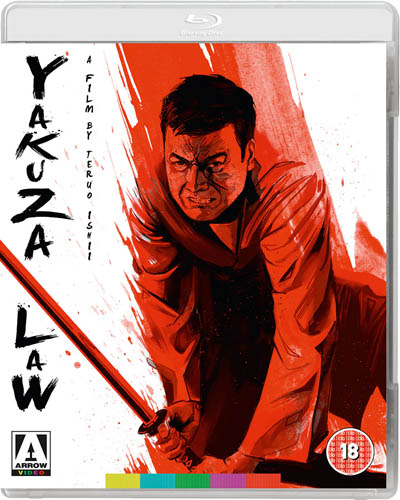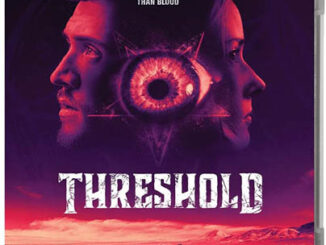Yakuza keibatsu-shi: Rinchi!, Yakuza Law (1969)
Directed by: Teruo Ishii
Written by: Teruo Ishii
Starring: Bunta Sugawara, Minoru Ôki, Ryûtarô Ôtomo

YAKUZA LAW (1969)
Written and Directed by Teruo Ishii
YAKUZA LAW is an anthology film showcasing three different stories of disobedience in the Yakuza clans set in three different time periods. The first is set in the Edo period and explores what happens when one of the major rules of not sleeping with a married woman, or at least a woman who is already taken by another, is broken. This particular segment also deals with many other types of of ideas such as honour, brotherhood and betrayal. One particular character from the off-set proves to be a scheming son-of-a-bitch as he chooses to hide in the bushes during a gang war. Afraid to actually get into the thick of it himself but keen to reap the rewards and approval from his boss, he wipes his katana in the wound of a dead body before smearing blood across his face. We see his weasel-like actions play out across the story and it’s justly rewarding when he receives his comeuppance. However, other Yakuza members who are more likeable do not get away unscathed either as ears are sliced, eyeballs popped out and other scenes of nastiness. In fact, much of the film is basically a set up for the different ways in which Yakuza members torture their own as a form of punishment. If it was made nowadays, it’d be seen as Yakuza torture porn. Even now it feels as though it’s verging on the gratuitous.
The second story, set in the Meiji period, sees Yakuza member Ogata hit a rival gang boss on request from his superiors. Though, after he’s lopped off the rival’s arm, his own clan believe it could start a gang war and one they’ll surely lose. To save face and their lives, they declare the Ogata’s hit unsanctioned and exile him from both the clan and Eastern Japan. Should he ever set foot in the region again, all gangs, including his own, will be out to punish him. Ogata’s obviously not pleased about this, especially when he’s caught by the local authorities and put in prison for murder whilst one of his scheming superiors in the clan makes up lies to Ogata’s girlfriend about his whereabouts. Dealing with revenge whilst also exploring the punishment of disobeying and causing trouble for one’s Yakuza family, this particular segment feels more in line with other Yakuza films and is more sensible in its approach compared to the first and third stories who seem to relish more in the variety of executions.
Finally, the third story focuses on the law that family secrets must not leaked or divulged and explores backstabbing between ambitious Yakuza family members in modern day 60’s Japan. The tale also introduces an outsider who’s accurate shooting skills gains the attention of a Yakuza member who’s looking to betray his boss. This particular segment is by far the messiest, both in terms of plot and executions, and it’s sometimes hard to keep up with where we’re meant to be up to in the upscaling gang wars. There’s people being burned, crushed, concreted and drowned and you begin to wonder if there’s going to be anyone left at this rate as each of the characters turn on one another.
Compared to the other Yakuza films I’ve watched over the years, YAKUZA LAW pales in comparison. The three stories, on their own and as an overall tale, just don’t deliver the experience I’ve been accustomed to. It feels more like any old story has been cobbled together just to create a reason for blood to be shed in a brutal way. Even the intro of the film hints at things to come with six grisly deaths depicted in a montage on screen and this is essentially what the film is: a series of deaths. It doesn’t feel clever at all and even though there’s some merit to each of the stories, my favourite being the middle one featuring exiled Yakuza member Ogata, the film doesn’t really connect and left me feeling alienated as a viewer.
I suppose rather than being a film about honour within criminal gangs, which is what many Yakuza films cover in a dramatic and serious way, YAKUZA LAW takes the idea and puts an exploitation spin on it. In some ways it serves the plot but overall it feels rather repetitive and caricaturish. Even the musical numbers playing throughout the scenes feel too over the top and bold compared to the weaker storylines. In my opinion, this is definitely a film that will appeal more to gore hounds than it will to traditional Yakuza movie fans who may be left wanting more from the movie than what is offered.
Arrow Video’s high definition Blu-Ray release includes audio commentary with author and critic Jasper Sharp, as well as a vintage interview with the film’s director Teruo Ishii who talks about his varied career.







Be the first to comment